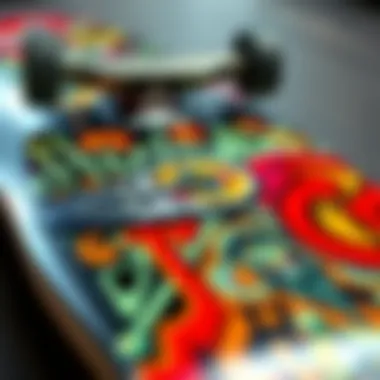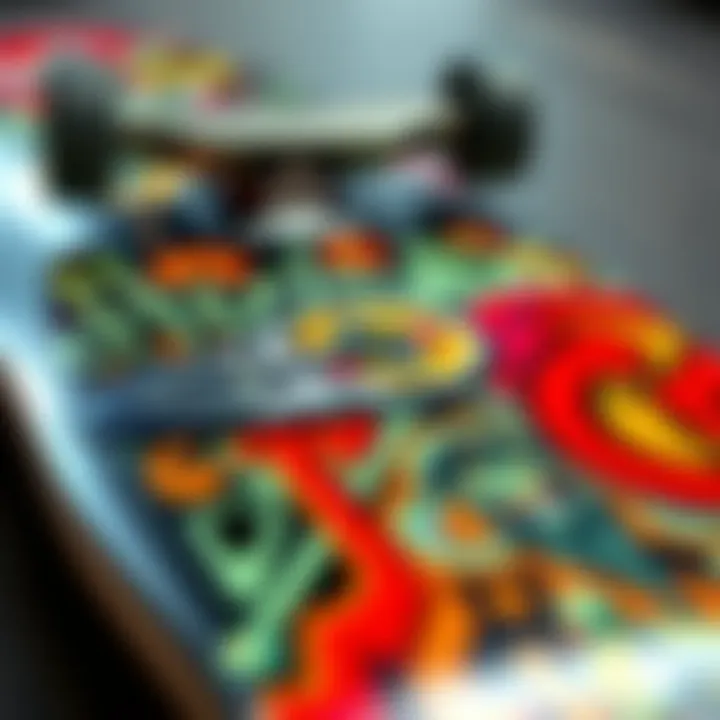Exploring the Intricacies of Tech Decks: A Comprehensive Guide


Intro
The tech deck phenomenon bursts into life through the intersection of skateboarding culture and the art of miniature engineering. As we navigate this unique realm, we discover not just toys, but also a rich tapestry woven together by passion, creativity, and a sense of community. The tech deck, a palm-sized replica of a skateboard, invites enthusiasts to engage in trick performances that mirror those seen in life-sized skating. This guide aims to demystify the various intricacies behind these small yet impactful items, from understanding the fundamental skills required to perform tricks to delving into customizable features that mirror the individuality seen on the streets.
This journey will unpack the layers of significance these tools hold within skate culture and highlight how both novices and seasoned pros contribute to a thriving community. By the end of our exploration, you'll have a well-rounded grasp of the tech deck universe, fostering not only skill development but also a deeper appreciation for this cultural artifact.
Skills Development
Developing skills around tech decks involves more than just flicking a finger here and there; it’s about dedicating time to practice and evolve. Those familiar with skateboarding will appreciate the parallels, but tech decks bring their distinct challenges. Here's where the real magic lies.
Trick Tutorials
Learning tricks on a tech deck can begin with the basics, much like a new skater learning to balance on a full-size board. Start simple:
- Ollie: This foundational trick elevates the board off the surface, mimicking the way it's done on a full-size skateboard. Start by placing your fingers on the tail; press down and slide your finger up the board. The timing here is crucial.
- Kickflip: After mastering the ollie, add a kickflip to your repertoire. With your fingers in similar positioning as the ollie, flick your finger on the edge to initiate a spin while elevating the board.
Utilizing online resources such as tutorials on reddit.com can greatly enhance your learning curve, offering visual aids and community tips.
Skill Progression Tips
Progressing in tech deck tricks requires both practice and theoretical understanding. Here are some strategies to aid your development:
- Consistency is Key: Set aside time daily to practice. Even 15-30 minutes can lead to remarkable improvements.
- Record Your Progress: Create video clips of your performances. You may observe nuances in your technique that require adjustments.
- Join Communities: Being part of online forums and local clubs can expose you to various styles, tips from experienced skaters, and potential collaboration opportunities.
As you develop these skills, you'll not only enhance your abilities but also form connections that enrich your understanding of the overall culture surrounding tech decks. Collectively, these elements propel you further into this miniaturized skate world, blending artistry, precision, and camaraderie.
Understanding Tech Decks
Understanding Tech Decks is fundamental to appreciating their role in both the skateboarding world and popular culture at large. These miniature skateboards have captured the hearts of enthusiasts and collectors alike, transcending simple toys to become symbols of a larger community and lifestyle. By delving into the intricacies of tech decks, one begins to grasp their evolution, functionality, and aesthetic appeal, facilitating a richer interaction with those who share this interest.
Tech decks are not just about tricks and flips; they encompass a culture that resonates with creativity and personalization. As we journey through this guide, we’ll unpack the various aspects of tech decks that contribute to their significance.
Understanding their definition and origins will set the stage for appreciating how deeply intertwined these devices are with skate culture. Moreover, recognizing their connection to this vibrant world enhances the experience of not only engaging with tech decks but also the art of skateboarding itself.
Definition and Origin
Tech decks, or fingerboards, emerged in the early 1990s, rooted in the playful spirit of skateboarding. They are often designed to mimic the real thing, from the size and shape of the deck to the intricate graphics adorning its surface. These miniatures allow skateboard enthusiasts to practice tricks and stunts using their fingers, effectively showcasing dexterity and skill.
Originally popularized by companies like Digital and Tech Deck, these tiny boards quickly garnered a cult following. Originating as a simple pastime, tech decks now boast a range of brands and styles, reflecting the trends of traditional skateboards. The designs often pay homage to legendary skateboarders, reinforcing tech decks’ ties to their larger counterparts in the skateboarding community.
Connection to Skate Culture
The connection between tech decks and skateboarding culture is profound. For many, these fingerboards serve as an introduction to the skateboarding world, igniting a passion that may lead to real-life skating. They are a medium through which enthusiasts communicate their creativity, often personalizing their boards with stickers or unique paint jobs.
This personalization extends beyond aesthetics; it reflects a skater’s personality and taste. The tricks performed on tech decks often mirror those seen on actual skateboards, allowing users to experience the thrill of skate culture in their own living rooms. The lines between the physical act of skating and the virtual mimicry on tech decks often blur, creating a unique dialogue between the two.
The tech deck community has grown immensely over the years, bringing together skaters, collectors, and creators who share a common love for the culture. Through social media platforms like Instagram and forums on Reddit, enthusiasts showcase their skills, swap tricks, and even trade their custom boards, fostering an environment of camaraderie that is both supportive and inspiring. This thriving culture serves not only to promote technical prowess but also to celebrate the artistry inherent in the world of skateboarding.
"Tech decks are more than just toys; they are gateways to a world of creativity and self-expression within skate culture."
In summary, understanding tech decks involves recognizing their origins, their significance in the skateboarding sphere, and the vibrant community that surrounds them. This foundation paves the way for exploring the various components of tech decks, their customization possibilities, and the skills that can be developed through their use.
Key Components of Tech Decks
Understanding the key components of tech decks is vital for anyone who wants to dive deeper into their unique construction and performance. Each element not only contributes to the aesthetic appeal but also significantly affects how the deck interacts with the user. Proper knowledge of these components empowers skateboarders, instructors, and shop owners alike to make informed choices about purchasing, customizing, or teaching.
Deck Types and Materials
The deck is essentially the foundation of a tech deck. Numerous types come into play, each crafted from different materials that contribute to its longevity and performance. Commonly, tech decks are made from wood, typically maple, which mimics the feel of a real skateboard. Maple offers a good balance between sturdiness and flex, which is essential for performing tricks.
There are also decks made from plastics, such as polycarbonate. These tend to be more durable and less susceptible to wear and tear than wood, which can be beneficial for beginner skaters who may drop their boards frequently. Some options have a more unique flair, utilizing materials like bamboo for a lightweight alternative that retains strength.
When choosing the deck, it’s important to consider the width and shape that suits your style. Wider decks give more stability, making them easier for beginners, while narrower decks can facilitate more intricate tricks as skateboarders progress.


Trucks and Their Functionality
Trucks are crucial for maneuvering and maintaining balance on a tech deck. They serve as the bridge between the deck and the wheels, allowing skaters to turn and perform tricks. The quality of the trucks can greatly influence the tech deck experience.
Made from aluminum or stainless steel, trucks vary in height and width to suit different skateboarding styles. Low trucks are often preferred for tricks that require a closer gravity pull, while higher ones can be better for turning and cruising smoothly. When selecting trucks, consider their responsiveness; a loose truck can assist in tight turns, but one that is too loose might lead to lack of control, particularly for novice users.
Moreover, bushings inside the trucks play a fundamental part as well. They allow for flexibility and responsiveness in turns, and the hardness of these bushings can affect the overall feel of the board. Softer bushings offer a more forgiving ride, whereas harder ones provide more precision for advanced tricks.
Wheels: Size and Hardness
The wheels of a tech deck are the little unsung heroes that often get overlooked. They come in various sizes and hardness levels, both of which impact performance on different surfaces. Generally, larger wheels roll faster and smoother, making them ideal for transitioning between obstacles with ease. Smaller wheels, on the other hand, can facilitate greater trick control, especially for flip tricks.
Hardness is measured on a durometer scale. Softer wheels (around 78A to 87A) grip better on rough surfaces, perfect for street skating, while harder wheels (above 88A) are better for smooth surfaces, aiding in quick slides and flips. The choice of wheels should align with your intended skating environment and style, making it pivotal for both performance and enjoyment.
In summary, understanding these components is like knowing the back of your hand for any tech deck enthusiast. Whether you're a newbie trying to find your footing or an expert looking to push the envelope, taking the time to explore the intricacies of each component will only enhance your riding experience.
"A tech deck isn’t just a toy; for many, it’s a way to express their passion for skateboarding on a miniature scale."
For further inquiries and tips, peer into forums on platforms like Reddit or Facebook, where communities share insights and advice.
Customization and Personalization
Customization and personalization stand at the heart of the tech deck experience, breathing life into what could merely be a mass-produced toy. This aspect not only allows users to express their unique styles and preferences but also enhances their connection to skate culture. Reflecting individual creativity can turn a simple tech deck into a symbol of personal identity—almost like a canvas on which a skater expresses their passion and individuality.
Personalizing tech decks can range from elegant designs to wild, colorful stickers. One might consider that it isn't solely about aesthetics; rather, it's an amalgamation of art, culture, and practical functions that make each tech deck special. The act of customizing influences the overall performance, allowing users to refine their decks to their specific tastes and skating styles.
Art and Aesthetics
The art and aesthetics of tech decks serve as the first layer of personalization. Decks can be adorned with graphics that resonate with the rider's ethos or just something that looks cool. One of the more intriguing aspects comes from the design choices; some skaters opt for minimalistic patterns, while others may parlay into vibrant illustrations or even edgy graffiti.
When selecting decks, many enthusiasts look for limited editions from brands like Element and Baker, as these could serve both as functional boards and collectible pieces. Art can embrace themes ranging from pop culture references to abstract forms, symbolizing an extension of the rider's personality.
The thrill in creating custom designs lies not just in the final product but also in the process itself. Skaters often engage in DIY techniques like spray painting, varnishing, or applying heat transfer decals to produce their masterpieces. Beyond the visual appeal, these designs can create discussion points among fellow skaters, helping build a community around shared values and interests.
Functional Modifications
Moving beyond the surface, functional modifications take personalization a step further. Understandably, no two skaters are alike, and their preferences in how their tech decks perform may widely vary. The ability to swap out parts such as trucks and wheels can drastically change the feel and performance of a deck.
For instance, heavier wheels can provide stability while lighter ones facilitate quick flips and spins. Tinting the wheels or using silicone-based parts can allow for smoother tricks and a dialed-in riding experience.
Another aspect to consider is the size of the deck itself—some riders prefer a wider board for enhanced balance, while others lean toward narrower options that offer quick maneuverability. Besides, experimenting with engineering techniques to achieve better grip tape adjustments or mounting new hardware can be crucial for optimizing one's skill set.
"Customization is not just aesthetic; it’s a journey into discovering what works best for you."
Tech Deck Tricks and Techniques
Tech decking isn’t just about having a cool miniature skateboard; it’s about mastering tricks and honing skills that mirror the action of real-life skateboarding. This section delves into the various levels of tricks—from the simple flicks to the jaw-dropping stunts—that can elevate one’s tech deck prowess. Understanding these techniques is vital for anyone wanting to fully immerse themselves in tech deck culture. Mastering tricks not only enhances one's finesse but also fosters creativity and confidence. With tech decks, the only limit is your imagination.
Basic Tricks for Beginners
If you’re just stepping onto the tech deck scene, starting with elementary tricks is essential to build a solid foundation. Here are a few key moves:
- Ollie: This foundational trick involves popping the tail of the deck and sliding your fingers up to level it in the air. It sets you up for more complex stunts.
- Kickflip: After nailing the ollie, the kickflip introduces a rotation. Flick your fingers outwards to spin the board as it elevates. Practicing this can help with the timing and coordination needed for further advanced tricks.
- Grinds: There are several grind tricks you can try. Think of sliding the board on railings or ledges. Start with the simple nose grind and progress from there. The goal is to keep the balance while the board slides.
Beginning with these tricks not only gives a sense of achievement but also lays the groundwork for more challenging maneuvers. Practice makes perfect, right?
Intermediate Skills to Master
Once the basic tricks feel like second nature, it's time to step up the game. Intermediate skills require a mix of stability, creativity, and timing. Here’s where you can begin:
- Heelflip: This is like the kickflip but instead of flicking outward, you push the board back with your fingers. It’s a different feel and unlocking it will broaden your repertoire dramatically.
- Manual: A skill that exhibits control; it’s all about balancing on the back wheels. To get into a manual, push off and lift your front fingers just slightly while keeping your balance. Mastering this can not only look impressive but also lead you into further tricks through transitions.
- Board Slide: Find an edge and make your board slide across it. A step beyond the grind, it requires finesse to execute cleanly without falling off.
These tricks will not only boost your own confidence but can also allow you to interact with the community at a different level.


Advanced Techniques and Stunts
Diving into advanced tricks is where the real artistry begins. These techniques often require immense practice and dedication:
- 360 Flip: This trick is like a kickflip but with a spin involved, making it one of the more difficult combos around. Get your stance right and prepare to take that leap!
- Bigspin: For this, you need the board to do a full rotation while your fingers shift and guide the deck. This eye-popping stunt is sure to get you noticed in any tech deck scene.
- No-Comply: This trick captures the essence of skate culture. It involves popping the board into the air while your fingers remain grounded. It’s a playful move that shows skill, style, and creativity—perfect for engaging with an audience.
Mastering tech deck tricks isn't just about showing off. It’s about personal growth within a vibrant subculture. Each trick may seem simple at first—but as your skilled fingers navigate the board, the sense of accomplishment you feel after nailing a challenging stunt is unparalleled. Keep pushing your boundaries!
"The beauty of tech decking lies in its ability to fuse technical skill with creative expression."
For more tips and to engage with others in the community, check out resources like Reddit Tech Deck Community and the Skateboarding Wikipedia page. Help yourself connect and learn in the vast world of tech decks.
The Tech Deck Community
The Tech Deck community serves as the lifeblood of the tech deck culture, knitting a diverse group of enthusiasts into a vibrant tapestry of passion and creativity. The significance of this community cannot be overstated; it brings together skateboarders, collectors, and casual players under a shared love for fingerboarding. Personal connections forged within this realm often transcend geographical boundaries, forming friendships that span the globe.
While tech decks are miniature representations of their full-sized counterparts, the community encapsulates a massive spectrum, from those who enjoy them for fun to dedicated collectors who treat these tiny skateboards as serious investments. By exploring the layers within this community, one can appreciate its multifaceted nature and the benefits it offers to every participant.
Building Connections
Building connections within the tech deck community is akin to finding kindred spirits. It’s about exchanging ideas, sharing tricks, and showcasing unique board designs. Whether you are a novice just dipping a toe into the fingerboarding pool or a seasoned expert, there are numerous avenues to connect with fellow aficionados.
- Local Skate Shops: Many local skateboard shops host events or workshops dedicated to tech deck enthusiasts. Participating in these events often leads to meeting other tech deck fans who are eager to share their knowledge and experiences.
- Social Media: Platforms like Instagram and Facebook have become hotbeds for tech deck enthusiasts to showcase their custom boards and tricks. Following hashtags related to tech decks allows for continuous interaction amongst users. Engaging in these discussions can lead to deeper connections and collaboration opportunities.
"The joy of the tech deck community lies not just in the boards, but in the friendships and collaborations that unfold."
- Local Meetups: More casual meetups can happen in skate parks or local hangouts where tech deck fans gather. These informal gatherings often foster creativity and learning, as individuals share tips and showcase their latest tricks.
Online Platforms and Forums
In the digital age, online platforms and forums have emerged as pivotal spaces for the tech deck community to thrive. Engaging on these platforms allows individuals to connect with like-minded enthusiasts regardless of their physical location.
- Reddit: Subreddits dedicated to tech decks are treasure tubs of information. Users share tutorials, tricks, and tips while also engaging in discussions about the latest trends in the fingerboarding niche. It’s a place where both beginners and experts can seek assistance and share their latest experiences. Explore r/Fingerboarding for a deep dive into this community.
- Facebook Groups: Facebook houses numerous groups focused entirely on tech decks. Members actively trade, sell, and discuss various aspects from customization to the latest releases. Joining these groups not only keeps users informed about the latest happenings but also allows them to connect with fellow collectors and developers.
- Dedicated Forums: Websites specifically tailored for fingerboarding enthusiasts often include a wealth of resources. Members can discuss everything from preferred board brands to how to perfect their tricks. These spaces are invaluable for those looking to deepen their understanding and skills further.
Through these online platforms, the tech deck community expands at an unprecedented rate, creating a space where creativity, friendship, and learning are constantly nurtured.
Safety Considerations
The allure of tech decks may draw seasoned skaters and newbies alike, but it's crucial to remember that with fun comes responsibility. Safety considerations play a pivotal role in ensuring an enjoyable experience without unwanted mishaps. Tech decking, while a relatively low-impact hobby compared to its full-scale counterpart, does present certain risks that shouldn't be underestimated. From finger strains to potential damage to valuable collectibles, being aware of safety can mean a world of difference in preventing accidents and prolonging the life of your gear.
Basic Safety Tips for Beginners
Engaging with tech decks is a fantastic way to hone skills and soak up the culture of skating without the need for a skate park. However, beginners should take careful steps to mitigate risks of injury. Here are some essential safety tips:
- Warm Up: Just like any physical activity, starting with light stretching can help prevent finger strains or injuries. A few minutes of simple motions can keep your hands and wrists limber.
- Choose Suitable Surfaces: Make sure you're working on a flat, stable surface. A wobbly table or uneven ground can lead to off-balance moments, potentially injuring your fingers or causing your deck to sustain damage.
- Take Breaks: It’s easy to get caught up in practice. However, regular breaks can significantly reduce the risk of overuse injuries.
- Mind Your Surroundings: Keep your practice area free from clutter and distractions. By ensuring there’s enough room to maneuver, you’ll reduce the chances of accidentally knocking over items or hurting yourself.
- Use a Grip Tape: Consider applying some grip tape to your tech deck. This can help improve control and reduce the likelihood of slipping during tricks.
By following these straightforward suggestions, beginners can immerse themselves in the world of tech decks while minimizing any risk.
Choosing the Right Gear
Selecting the right gear is vital for both performance and safety when it comes to using tech decks. Here’s what to consider to ensure you’re set up for success:
- Quality Decks: Opt for reputable brands known for their durability. Investing in well-made decks can prevent unexpected breakage mid-trick, which could lead to injury.
- Use Protective Gear: Even though it’s fingerboarding, consider using finger guards. This can be especially beneficial if you’re just starting out and will be practicing a lot.
- Pick the Right Size: Ensure your tech deck fits comfortably in your hands. Decks come in various widths and lengths, so find one that suits your grip and style.
- Components Compatibility: Ensure that all components, from trucks to wheels, work well together. Incompatible parts can lead to equipment failure, which, in turn, can cause accidents.
With the right setup and precautions, any individual can dive into this engrossing pastime, ensuring a safe and enjoyable experience from the get-go.
"Safety isn’t just a priority; it's a way of life while enjoying tech decks."
For more insights on staying safe while enjoying tech decks, communities such as Reddit's Fingerboarding Forum provide a platform for sharing experiences and tips. Don't overlook your safety as you explore this fascinating extension of skate culture!
The Future of Tech Decks
The world of tech decks is always on the move, and looking ahead brings a whirlwind of excitement. As the skateboarding landscape evolves, so does the realm of mini boards. This section takes a closer look at what the future holds for tech decks, touching on the innovative technologies that are reshaping how enthusiasts interact with these collectibles, as well as the shifting trends in customization that continue to captivate users worldwide.


Technological Innovations
With advancements in technology permeating every aspect of life, it’s only natural that tech decks would be influenced as well. Imagine a future where tech decks are not just physical objects, but integrate technology for an enhanced experience. We could be looking at models equipped with sensors that track tricks or provide feedback via a connected app.
Moreover, 3D printing opens up boundless possibilities for producing customized parts at a personal level. Instead of a one-size-fits-all approach, riders could create their own unique decks, tailored down to the tiniest detail. This democratization of production means that no two boards need to be alike, pushing creativity into the forefront of the community.
In addition to mobile integrations, augmented reality could play a massive role in how skaters learn and master tricks. Think of wearing AR glasses that guide users through each maneuver, offering instant visual feedback on their performance. The potential here is immense, allowing for a more immersive learning experience than ever before.
Evolving Trends in Customization
Customization has always been the beating heart of the tech deck culture. As we gaze into the future, one cannot help but notice shifts in what personalization means for the community. Today, the emphasis is on expressing individuality, and this is expected to deepen.
The use of eco-friendly materials is gaining traction, reflecting a growing awareness around sustainability. Tech deck enthusiasts are likely to gravitate toward boards made from sustainable sources, which not only look good but do good by the environment as well. This may also open avenues for community-driven projects, where groups come together to create eco-conscious products collaboratively.
Furthermore, digital platforms are likely to facilitate even more extensive sharing and selling of customized designs. For instance, imagine a flourishing online marketplace where creators can showcase their designs, receive feedback, and interact with fellow enthusiasts. The community could drive trends, effectively turning tech decks into a canvas for artistic expression.
"Customization isn’t just about the tech deck itself; it’s about the stories and connections it symbolizes within the community."
With all these elements on the horizon, it’s clear that tech decks are not only here to stay but are evolving into a richer, more intricate experience. As tech advances and personalization trends shift, the future looks very promising for tech deck lovers, ensuring the culture remains vibrant and relevant.
Collecting Tech Decks
Collecting tech decks has become not just a pastime, but a full-blown passion for many. For skateboarders, instructors, and shop owners, understanding the nuances of tech deck collecting is vital in grasping the entire culture surrounding skateboarding. Whether you're in it for the joy of owning unique models or the thrill of trading with other collectors, the act of collecting can be quite rewarding. It helps build connections within the community and ensures these miniature skating boards are not simply toys but artifacts of an evolving culture.
A serious collector dives deep into the world of tech decks, hunting down models that feel like gems in a treasure chest. Part of what makes collecting so exciting is the rarity of certain models and the stories behind them. This chapter will look closely at valuable models and rarity, as well as delve into marketplaces and trading habits among the community.
Valuable Models and Rarity
When it comes to collecting, value is often tied to rarity. Certain tech decks are produced in limited runs, making them highly sought after. These decks can be steeply priced at auctions or through collectors, reflecting not just the craftsmanship but also the scarcity of availability.
Some collectors focus on specific trends, such as:
- Signature Decks: Models designed or endorsed by professional skaters.
- Limited Editions: Decks released during specific events or anniversaries, which often feature unique artwork.
- Vintage Pieces: Older models that signify the roots of tech deck culture.
A deck that was once just a toy may evolve into a highly coveted piece. Thus, understanding the market is crucial for anyone looking to invest wisely.
"In the collecting world, knowing the backstory of your deck can add layers of appreciation and value."
Marketplaces and Trading
Navigating the marketplaces for tech decks can be as thrilling as the collecting itself. With the rise of digital avenues, collectors now have a plethora of options to buy, sell, and trade. Here are some of the most popular platforms:
- eBay: A treasure trove for rare finds, eBay allows for bidding on sought-after models.
- Facebook Marketplace: Local buying and trading can foster community ties while finding unique pieces.
- Reddit: Subreddits dedicated to tech decks can be an excellent resource for trading as well as gathering insights on value.
Tech deck trading is often about knowing the right people; many collectors have a tape measure in one hand and an eye for quality in the other. Negotiating trades can be an art form and understanding market value takes time. Also, brand loyalty plays a role. Collectors often find themselves deeply rooted in one brand and its community, which can lead to some very passionate discussions.
Ultimately, it's not just about the decks, but the stories that come with them. The act of trading can provide valuable experiences and increase your knowledge base, making you a more well-rounded collector in the long run.
Epilogue
As we wrap up this comprehensive guide, it's clear that the world of tech decks is not merely a pastime but a blend of culture, creativity, and community. Understanding the intricacies of tech decks emphasizes their significance within skate culture. Beyond just toy replicas, these miniature skateboards carry profound stories, showcasing both personal expression and shared experiences among skaters. The ongoing evolution of tech decks reflects broader trends in skate culture while encouraging new enthusiasts to join the ride.
"The wheels of creativity spin fast in the tech deck scene, inviting anyone with a spark of passion to participate." - Anonymous
Recap of Key Points
In summarizing this article, we highlighted several key aspects:
- Definition and Origin: Tech decks have roots tied closely to skate culture, starting as a fun, accessible way to replicate iconic skate moves.
- Key Components: We explored various parts like decks, trucks, and wheels, emphasizing their role in performance and customization.
- Customization and Techniques: Personalization is a big part of the joy that comes with tech decks, allowing for unique expression through art and functional modifications.
- Community Interaction: The vibrant tech deck community thrives on online platforms and local meetups, fostering connections and skill sharing.
- Future Directions: We looked at how technology and evolving trends shape the future of tech decks, keeping the culture dynamic and engaging.
- Collecting Fare: A dive into the world of collecting underscored the value of rarity and the thrill of trading.
Overall, tech decks represent a microcosm of skating life, far beyond a child's toy. They embody artistry, camaraderie, and the thrill of mastering tricks within a cozy community.
Encouragement for Further Exploration
For those intrigued by the multifaceted nature of tech decks, there's no limit to what you can discover. Consider connecting with other enthusiasts, participating in tech deck events, or even refining your skills through practice. Joining platforms like Reddit (reddit.com/r/techdeck) can offer fresh insights and foster new friendships.
Additionally, online tutorials are invaluable resources for mastering basic to advanced tricks. Sites like YouTube offer endless videos from pros and amateurs alike, which can help sharpen your techniques.
Attending local workshops or skate parks to witness live performances can provide inspiration. Whether it’s an eye-catching deck design or a new trick you've never seen, there's always something fresh around the bend.
In the ever-evolving landscape of tech decks, every skater has a story to tell. Share yours, explore the art of customization, collect with passion, or simply enjoy the ride on your own tech deck. The possibilities are as vast as the ocean, waiting just for you to dive in.



